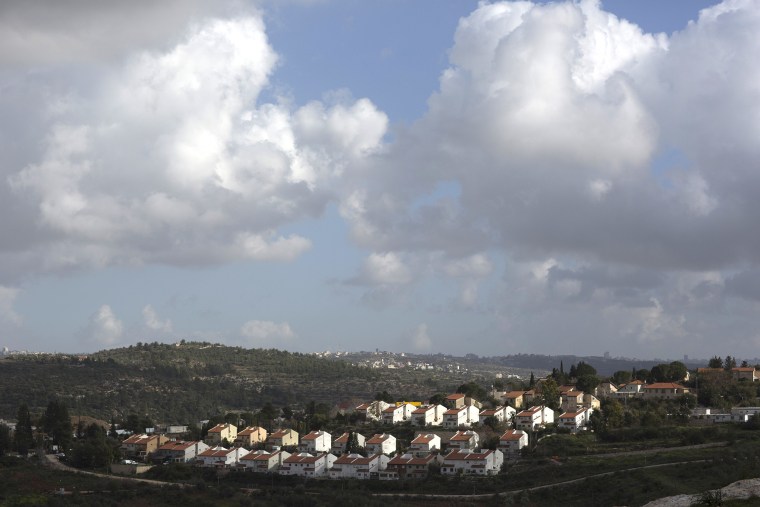Israeli Prime Minister Benjamin Netanyahu announced Tuesday that he may annex the Jordan Valley and other parts of the occupied West Bank "in coordination" with the United States in an apparent last-ditch effort to attract right-wing voters before national elections next week.
"This is a historic opportunity to apply sovereignty to communities in Judea and Samaria," Netanyahu told reporters, referring to the West Bank by its biblical name.
"I request a mandate to apply Jewish sovereignty to all communities, and I intend to do so in coordination with the United States."
Netanyahu added that the U.S. would present its long-awaited Israel-Palestinian peace plan a few days after the election.
"If I choose, I will contain Israeli sovereignty over the Jordan Valley and the northern Dead Sea. This will be the first step if I choose," he said.
Netanyahu was addressing supporters in the southern city of Ashdod when his campaign rally was interrupted by rocket fire on Tuesday night.
The Israeli military says that it intercepted two rockets launched from the Gaza Strip, and Netanyahu was taken off stage by security guards as air raid sirens blared. He returned minutes later and continued his speech.
Most of the international community considers Israeli settlements in the West Bank illegal under international law and an impediment to a two-state solution to the conflict.
"There is no change in United States policy at this time," a Trump administration official said when asked about Netanyahu's move. "We will release our Vision for Peace after the Israeli election and work to determine the best path forward to bring long sought security, opportunity and stability to the region."

Netanyahu's announcement, which risks shattering the fragile status quo in the volatile region, came as Israel prepares for an unprecedented repeat election next week.
The country is heading to the polls on Sept. 17 after Parliament was dissolved after an April vote in which Netanyahu failed to cobble together a government.
He is fighting for his political survival next week. Haaretz newspaper’s poll of polls suggests that his Likud party is on course to win 32 seats in the 120-seat Israeli parliament, three fewer than he won in April.
Netanyahu needs 61 seats to form a governing coalition — in Israel’s parliamentary system no party has ever commanded a majority.
And for the embattled prime minister, more than his political career is at stake. He is bracing for expected criminal charges in a corruption case and if he wins he hopes to pass legislation that would grant him immunity.
'A good start'
The Jordan Valley runs along the easternmost part of the Israeli-occupied West Bank near the border with Jordan. Netanyahu has long advocated the strategic importance of the region and took then-national security adviser John Bolton on a helicopter tour of the valley in June (Bolton resigned on Tuesday).
Israel occupied the West Bank, along with East Jerusalem, Gaza and the Syrian Golan Heights, in the 1967 Arab-Israeli war. It effectively annexed East Jerusalem in 1980, and the Golan Heights in 1981, although neither move was accepted internationally for decades. But the Trump administration has since recognized both steps, overturning previous U.S. policy.
Palestinian leaders slammed Netanyahu's announcement and called for peace.
Hanan Ashrawi, a veteran Palestinian politician, said it was “dangerous” and an example of the prime minister's “ethnic cleansing agenda.”
“Netanyahu’s cheap pandering to his extremist racist base exposes his real political agenda of superimposing 'greater Israel' on all of historical Palestine & carrying out an ethnic cleansing agenda,” she tweeted Tuesday.
Saeb Erakat, secretary general of the executive committee of the Palestine Liberation Organization, tweeted that the region had seen “enough wars.”
“We need to end the conflict and not to keep it for another 100 years, as Netanyahu plans,” he said.
By contrast, the head of the regional council in the Israeli settlement bloc Gush Etzion said applying sovereignty to the West Bank was a "dream come true."
"This Jordan Valley is a good start, and we refer to it as the beginning of the road," said Shlomo Ne'eman. "Following the Jordan Valley must come Gush Etzion and then the rest of the homeland, which is an hourly order."
The Sovereignty Movement, which advocates annexing the entire West Bank, also welcomed the announcement, saying it made the chances of establishing a Palestinian state less likely.
"This is a move that puts a damper on the grim idea of establishing another Arab state in the heart of the country," it said in a statement.
It is not the first time Netanyahu has vowed to annex parts of the region. Ahead of the elections in April he pledged to annex Israeli settlements in the West Bank and then repeated the pledge in August but gave no deadline.
Today, the West Bank is home to almost 3 million Palestinians and more than 400,000 Israelis, according to figures collated by Peace Now, an Israeli organization that advocates a two-state solution. The Israelis live in around 132 settlements that were established by the government and some 113 outposts that were founded without government approval, according to the group.
Some 48 percent of Jewish Israelis and 11 percent of Arab Israelis would favor annexing Israeli sovereignty over the Jordan Valley after the election if it were supported by President Donald Trump and his administration, according to the Israel Democracy Institute, a research group based in Jerusalem.